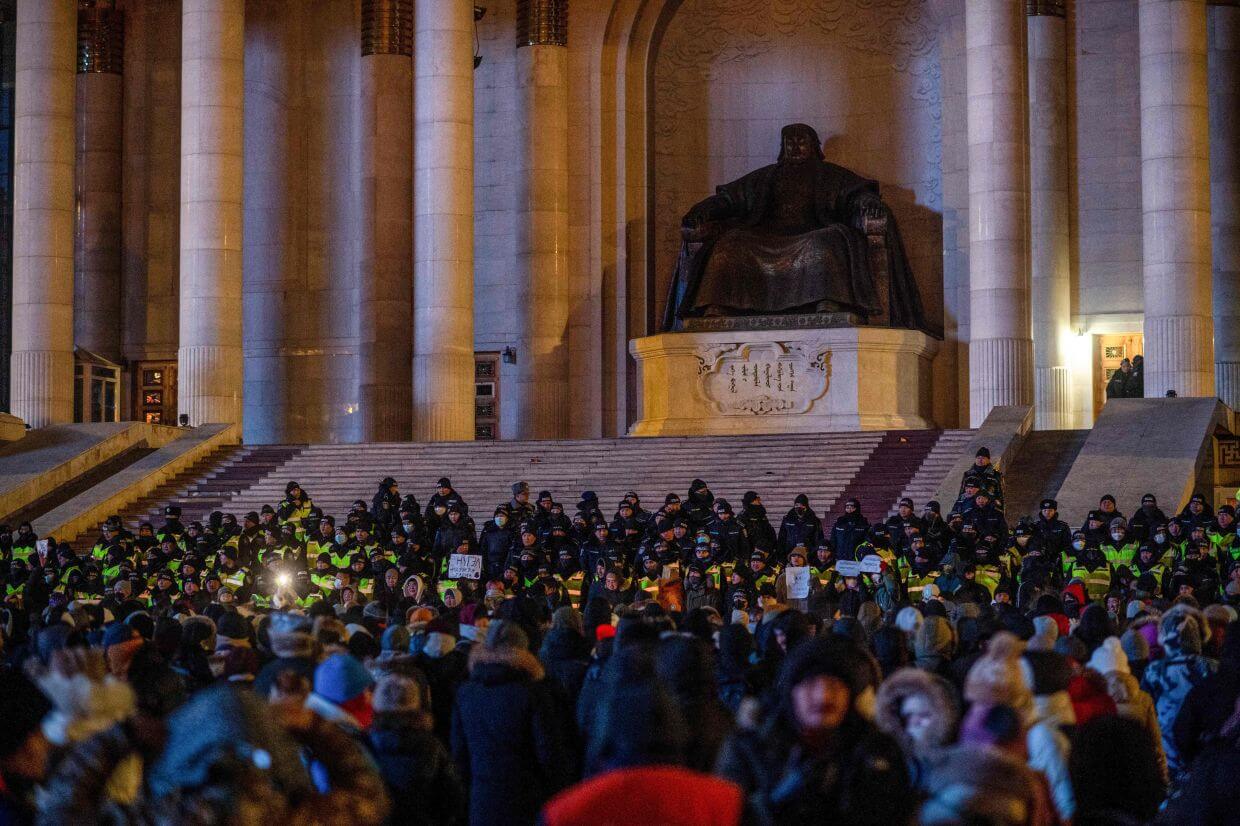Thousands of Mongolian citizens braved extreme temperatures on Monday and gathered in the capital to protest against economic struggles stemming from corruption in the coal industry and the rising cost of living.
The protesters, mostly comprising young people, -21°C weather in Ulaanbaatar’s Sukhbaatar Square in front of the Government Palace. Police attempted to disperse the crowd around 9 pm local time but public discontent turned the mood tense and scuffles broke out between people and law enforcement.
Local media reported that some citizens expressed anger by toppling barriers and breaking windows. A few even tried to break into the government palace. However, most of them cleared out of the area a few hours after clashes with the police.
According to Mongolian media, $1.8 billion in coal was stolen in the first nine months of the year, while total Mongolian coal exports totaled $4.5 billion, according to China.https://t.co/0AomVaQjwh
— Gurbaksh Singh Chahal (@gchahal) December 5, 2022
Demonstrators also attempted to march on Ikh Tenger, the official residence of the country’s president and prime minister, but police were able to keep them at bay with the help of barricades.
Landlocked between China and Russia, Mongolians have been growing increasingly restless with the economic lag caused in part by Russia’s invasion of Ukraine and the country’s closed borders with China due to COVID-19 restrictions. These factors have contributed to inflation soaring to 15.2%.
In addition, tempers have further flared after Ulanbataar’s anti-corruption authority disclosed last month that more than 30 legislators with links to the country’s coal industry had embezzled billions of dollars.
To this end, protesters called for “justice” against corrupt lawmakers and for the country’s parliament to be dissolved.
This protest was sparked by the Coal Theft protest that happened on Sunday, December 4th, but this was a referendum on the April youth protest, and the people came out demanding accountability from the government. 2/5 #Mongolia
— Anand Tumurtogoo (@Anand@journa.host) (@AnandDairtan) December 5, 2022
The group of accused officials includes the CEO of state-owned mining company Erdenes-Tavantolgoi JSC, Gankhuyag Battulga, who oversees an operation involving 7.5 billion tonnes of coking coal.
Whistleblowers have alleged that corrupt lawmakers have misused their high-profile portfolios and made large illegal profits by failing to register coal sold to China.
This corruption is also contingent on the complicity and silence of transportation companies. Furthermore, corrupt customs officials have registered coal-carrying trucks as regular passenger vehicles instead of registering them under imported goods when they cross the border to China.
“6.4 million tons coal is not registered by Mongolian customs officials but recorded by Chinese customs, since 2013,” Member of Parliament (MP) Dorjhand Togmid said in a press conference last month.
The protesters chanted at the cops to unite with them and stop protecting those who stole from the public. 4/5 pic.twitter.com/zBk7KHNued
— Anand Tumurtogoo (@Anand@journa.host) (@AnandDairtan) December 5, 2022
The group of implicated lawmakers is currently under investigation for embezzlement.
Coal constitutes a key source of national income; 86% of Mongolian exports go to China, more than half of which comprises coal. The country earns over a quarter of its gross domestic product from mining.
Ulaanbaatar is also in the process of upgrading its railway infrastructure to connect to Chinese ports and plants as it looks to quickly increase its export volume to Beijing before the Asian superpower eventually phases out its use of coal.
“They seem to forget what they promised us – they promised us a better life. They are supposed to make things better,” a female student who identified herself as Bayarmaa told AFP.
“But they aren’t doing anything, taking our money, filling their own bellies,” she added.
Jana Zilkova, country director for the aid group Caritas Czech Republic in Ulaanbaatar, told Al Jazeera that citizens were “suffering incredibly economically.”
They “are upset and angry over this case because they were promised the wealth of the country would be shared with them,” she added.

